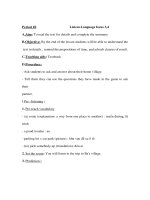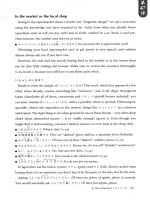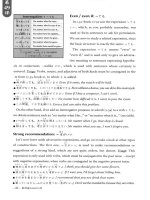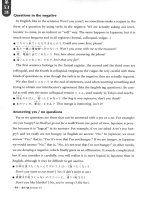In focus 3 sb
Bạn đang xem bản rút gọn của tài liệu. Xem và tải ngay bản đầy đủ của tài liệu tại đây (46.19 MB, 120 trang )
www.frenglish.ru
www.frenglish.ru
www.frenglish.ru
Student’s Book
3
Charles Browne • Brent Culligan • Joseph Phillips
i
www.frenglish.ru
79 Anson Road, #06-04/06, Singapore 079906
Cambridge University Press is part of the University of Cambridge.
It furthers the University’s mission by disseminating knowledge in the pursuit of
education, learning and research at the highest international levels of excellence.
www.cambridge.org
Information on this title: www.cambridge.org/9781107680074
© Cambridge University Press 2014
This publication is in copyright. Subject to statutory exception
and to the provisions of relevant collective licensing agreements,
no reproduction of any part may take place without the written
permission of Cambridge University Press.
First published 2014
Printed in Singapore by Markono Print Media Pte Ltd
ISBN 978-1-107-68007-4 paperback Student’s Book 3
ISBN 978-1-107-68523-9 paperback Teacher’s Manual 3
Additional resources for this publication at www.cambridge.org/infocus
Cambridge University Press has no responsibility for the persistence or accuracy of
URLs for external or third-party internet websites referred to in this publication,
and does not guarantee that any content on such websites is, or will remain,
accurate or appropriate. Further, certain website URLs in this publication are fictitious
or have been fictionalised, are for illustrative purposes only, are not intended to be
factual, and should not be relied upon as factual.
Information regarding prices, travel timetables, and other factual information given
in this work is correct at the time of first printing but Cambridge University Press
does not guarantee the accuracy of such information thereafter.
www.frenglish.ru
Contents
Plan of the book
Acknowledgments
iv
viii
To the teacher
ix
How a unit works
x
To the student
xii
UNIT 1
1
UNIT 2
9
UNIT 3
17
UNIT 4
25
UNIT 5
33
UNIT 6
41
UNIT 7
49
UNIT 8
57
UNIT 9
65
UNIT 10
73
UNIT 11
81
UNIT 12
89
Activities
97
Core vocabulary: keywords
Unit-by-unit list
104
Alphabetical list
105
Credits
106
iii
www.frenglish.ru
Plan of the book
Cycle 1
Unit
1
Title/Topic
Reading texts
Reading skills
Vocabulary
Gender
Equality
1 The Iron Lady
Scanning
Definitions
2 What If Women Ruled
the World?
Skimming
Etymology:
words with just or ju
Example: justification
Equality of the sexes
in societies
Understanding the text
Paraphrasing
Making inferences
Cycle 1
Pages 1–8
2
A Thirsty
World
1 The Cochabamba
Water War
Scanning
Definitions
Skimming
2 Water Worries
Understanding the text
Etymology:
words with conscious
Example:
consciousness
Water access,
consumption, and
future global water
scarcity issues
Reference words
Making inferences
Cycle 1
Pages 9–16
3
Nuclear
Power: Clean
and Bright
1 Green Energy?
Scanning
Definitions
2 The One Energy
Solution
Skimming
Etymology:
words with trans
Example: transmission
Understanding the text
Recognizing contrasts
The benefits of
nuclear energy
Making inferences
Cycle 1
Pages 17–24
4
Cycle 1
Pages 25–32
5
Cycle 1
Pages 33–40
6
Pages 41–48
iv
Free Trade:
Cheap Goods
or Good
Jobs?
1 The North American
Free Trade
Agreement
2 Free Trade = No
Bargain
Video game and
Internet addiction
Etymology:
words with capital
Example: capitalist
Understanding the text
Cause and effect
1 None in Laredo
Scanning
Concordances
2 The End of the Store
as We Know It
Skimming
Idioms with horse
Example: back the
wrong horse
Understanding the text
Identifying reasons
Recognizing bias
The effect of the
Internet on retail and
other industries
Online
Addiction:
Too Much
Fun?
Concordances
Skimming
Making inferences
The social impact of
free trade
Online
Retailing:
Disappearing
Stores
Scanning
1 Internet Addiction
Scanning
Concordances
2 Fun, Popular, and
Deadly
Skimming
Phrasal verbs with pass
Example: pass away
Understanding the text
Identifying reasons
Prediction: concluding
statements
www.frenglish.ru
Critical thinking
Research skills
Writing
Skills
Speaking
Information gathering
Writing a paragraph outline
on the topic of women in
power
Identifying fact or
assumption
Discussion
Completing a mind map:
women in power
Tip: Listening
•
Level of gender equality
Interpreting and reporting
results
•
Explaining differences
Topic sentence, main points,
example
•
New laws for gender equality
Quotable Quotes
•
Discussing the ways boys
and girls are raised
Information gathering
Writing a paragraph
Categorizing statements
Presentation
•
Giving an opinion on the
topic of water demand
Completing a mind map:
water demand
•
Water resources and
consumption by country
Solutions to the world’s
water crisis
Interpreting and reporting
results
Tip: Structuring your
presentation
•
Quotable Quotes
Explaining differences
•
Globalization and access to
safe water
Information gathering
Writing a paragraph
Identifying fact or opinion
Role play and debate
•
Giving a personal opinion
about the pros and cons of
nuclear power
Completing a mind map:
pros and cons of nuclear
power
•
Two nuclear accidents
Interpreting and reporting
results
•
Comparing the accidents
Opinions about nuclear
power
Tip: Asking for opinions
Quotable Quotes
•
Discussing energy sources
and the politics of energy
dependency
Information gathering
Writing a paragraph
Clarifying statements
Discussion
•
Giving a personal opinion
about the pros and cons of
free trade
Completing a mind map:
pros and cons of free trade
•
Global production and trade
over time
Interpreting and reporting
results
•
•
Growth in online shopping
Interpreting and reporting
results
•
Tip: Summarizing key points
Quotable Quotes
Analyzing trends
Information gathering
Pros and cons of building a
new factory
•
Writing a paragraph about
the effects of showrooming
Using patterns of reasoning
Discussing equality and free
trade
Identifying cause and effect
Presentation
Understanding patterns of
reasoning
•
The effect of technology on
the newspaper and travel
industries
Tip: Transition signals
Comparing trends by country
Quotable Quotes
•
Information gathering
•
Video game facts and
partner interview
Interpreting and reporting
results
•
Comparing and discussing
results about gaming
Writing a letter to a
newspaper
Using patterns of reasoning
to describe the negative
effects of video games
Discussing the effect of the
Internet on publishing and
other industries
Decision-making
Role play and debate
Understanding patterns of
reasoning
•
Government regulation and
video games
Tip: Disagreeing
Quotable Quotes
•
Discussing the pros and cons
of video games and TV
v
www.frenglish.ru
Plan of the book
Cycle 2
Unit
7
Title/Topic
Reading texts
Reading skills
Vocabulary
Marriage
around the
World
1 Different Ways of
Tying the Knot
Scanning
Register
Skimming
2 Changing Views of
Marriage
Understanding the text
Idioms with break
Example: break with
tradition
The changing of
marriage in societies
Making inferences
Recognizing contrasts
Cycle 2
Pages 49–56
8
Fished Out:
Our Empty
Oceans
1 The Grand Banks
Scanning
Register
2 Our Desert Oceans
Skimming
Idioms with turn
Example: turn a blind
eye
Understanding the text
Reference words
The effects of
overfishing
Making inferences
Cycle 2
Pages 57–64
9
Renewable
Energy: the
Green Choice
1 Winds of Change
Scanning
Register
2 Beyond Fossil Fuels
Skimming
Phrasal verbs with run
Example: run out (of)
Understanding the text
Recognizing contrasts
The benefits of
renewable energy
sources
Making inferences
Cycle 2
Pages 65–72
10
(In)Equality in
a Richer World
1 The Lehman Shock
Scanning
Collocations
2 The Promotion of
Wealth
Skimming
Idioms with give
Example: give the
green light
Capitalism, other
economic systems,
and income equality
in societies
Understanding the text
Cause and effect
Making inferences
Cycle 2
Pages 73–80
11
The Office of
the Future?
1 High-Tech Companies
and Telecommuting
Scanning
Collocations
Skimming
2 Telecommuting
Understanding the text
Phrasal verbs with put
Example: put up with
Telecommuting
Identifying reasons
Recognizing bias
Cycle 2
Pages 81–88
12
Pages 89–96
vi
Social Media:
Changing Our
Lives
The impact of social
media on politics and
society
1 The Arab Spring and
Social Media
Scanning
Collocations
Skimming
2 A Networked World
Understanding the text
Phrasal verbs with
bring
Example: bring about
Paraphrasing
Prediction: concluding
statements
www.frenglish.ru
Critical thinking
Research skills
Writing
Skills
Speaking
Information gathering
Writing a paragraph
Using patterns of reasoning
to give a personal opinion
about marriage
Identifying fact or
assumption
Discussion
•
Marriage and divorce by
country
Interpreting and reporting
results
•
Understanding patterns of
reasoning
•
Pros and cons of arranged
marriage
Tip: Paraphrasing
Quotable Quotes
Explaining high and low
divorce rates
•
Discussing love and marriage
Information gathering
Writing a paragraph
Identifying fact or opinion
Role play and debate
•
Using patterns of reasoning
to give a personal opinion
about commercial fishing
Understanding patterns of
reasoning
•
Survey of fish stocks over
time
Interpreting and reporting
results
•
•
Writing a paragraph
•
Using facts and assumptions
to give an opinion about
renewable energy
Changes in global energy
sources
Interpreting and reporting
results
•
Tip: Voicing your opinion
Quotable Quotes
Summarizing and explaining
changes
Information gathering
Future fishing policy
Identifying fact or
assumption
Discussing the damaging
effects of humans on the
oceans
Presentation
•
Judging reasons
The best renewable energy
source for the future
Tip: Openers
Quotable Quotes
Discussing trends in energy
supplies
• Discussing cheap fossil fuels
and ways to promote renewable
energy
Information gathering
Writing a paragraph
Clarifying statements
Discussion
•
Using facts and opinions
to give a personal opinion
about capitalism
Judging reasons
•
Income inequality by country
Interpreting and reporting
results
•
Raising income tax to help
the homeless and
unemployed
Tip: Interrupting
Comparing wealth and
inequality
Quotable Quotes
•
Comparing the goals of
democratic governments
with those of corporations
Information gathering
Writing a paragraph
Identifying cause and effect
Role play and debate
•
Describing the pros and cons
of telecommuting and giving
a personal opinion
Judging reasons
•
Numbers of telecommuters
by employer type
Interpreting and reporting
results
•
Whether a college should
introduce e-learning
Tip: Stressing key words
Quotable Quotes
Discussing telecommuting
trends among employers
•
Discussing job satisfaction
and the balance between
work and life activities
Information gathering
Writing an email or a letter
Decision-making
Presentation
•
Making a recommendation
about Internet access at
work
Judging reasons
•
Numbers of users of popular
social media sites
Interpreting and reporting
results
•
Explaining growth rates of
different social media sites
Cyberbullying and how to
deal with it
Tip: Closers
or
Quotable Quotes
Saying what you plan to do
about cyberbullying
•
Discussing the impact of
social media on people
vii
www.frenglish.ru
Acknowledgments
Charles Browne would like to thank his wife, Yukari, and their three children, Joshua, Noah,
and Hannah. Joseph Phillips would like to acknowledge the support of his wife, Miho Tajima,
and their children, who tried to do their best to behave while he was working on In Focus.
Brent Culligan would like to thank his family, who provided most of the motivation to continue
this project, especially when the true extent of the commitment became apparent.
The authors thank Richard Walker for his tireless, patient, and positive support throughout
the entire writing process and Katherine Wong for her unwavering professionalism and help
during the various stages of the project.
Many people contributed to the development of In Focus. The authors and publisher would
like to particularly thank the following reviewers for their valuable insights:
Glenn Allies, International Graduate School of English, Seoul, South Korea; Shawn Beasom,
Chuo University, Tokyo, Japan; Mark Christianson, International Christian University, Tokyo,
Japan; Andrew Cook, University of Tasmania, Hobart, Australia; Tony Covello, Yeojoo Institute
of Technology, Yeoju, South Korea; Jay Fraser, Soongsil University, Seoul, South Korea;
Johnny Gou, National Taiwan University of Education, Taipei, Taiwan; Jason M. Ham,
the Catholic University of South Korea, Seoul, South Korea; Shu-fen Huang, National Central
University, Zhongli, Taiwan; Mitsuko Izutsu, Sapporo Gakuin University, Sapporo, Japan; Paul
Z. Jambor, Korea University, Seoul, South Korea; Steven Kirk, University of Tokyo, Tokyo,
Japan; Yayoi Kosugi, Keio University, Tokyo, Japan; J. Lake, Fukuoka Women’s University,
Fukuoka, Japan; Tae Lee, Yonsei University, Seoul, South Korea; Michael McCollister, Feng
Chia University, Taichung, Taiwan; Philip Moriarty, Chinese Culture University, Taipei, Taiwan;
Kazuhiro Nomura, Kobe City University of Foreign Studies, Kobe, Japan; Sakae Onoda,
Kanda University of International Studies, Chiba, Japan; Shuji Ozeki, Nagoya University,
Nagoya, Japan; Peeriya Pongsarigun, Chulalongkorn University, Bangkok, Thailand; Woralap
Sangvatanachai, Khon Kaen University, Khon Kaen, Thailand; Chris Shanks, British Council,
Bangkok, Thailand; David Travis Shaw, Indiana University Bloomington, IN, United States;
Richmond Stroupe, Soka University, Tokyo, Japan; Mingjen Tsai, National Pingtung University
of Science and Technology, Neipu, Taiwan; Modesto Tumacder, Dongguk University, Seoul,
South Korea; Yoko Wakui, Aoyama Gakuin University, Tokyo, Japan; Douglas Wood, British
Council, Bangkok, Thailand; Jennilee Yoon, Gachon University, Seongnam, South Korea
The authors thank Chris Caridia and Cambridge University Press staff:
Harry Ahn, Karen Brock, Seil Choi, Leo Chon, Sean Elwell-Sutton, Tomomi Katsuki, Alice Kim,
Nesha Naidu, Jinhee Park, Panthipa Rojanasuworapong, Mario Santos, Satoko Shimoyama,
Ivan Sorrentino, Stuart Vinnie, Irene Yang
Book and cover design by Designers Collective
Book layout by Transnet Pte Ltd
Illustrations by LiDan Illustration & Design Studio, and Transmise Publishing Service
Audio production by Anzak Modern Music Productions
viii
www.frenglish.ru
To the teacher
Welcome to In Focus, a three-level, corpus-informed course aimed at university
and college students. In Focus is designed to build vocabulary, reading, discussion,
presentation, and critical thinking skills. Each Student’s Book contains 12 topic-based
units, which are divided into two cycles of six general themes. Units follow a light
gradation of difficulty, which allows you to vary the order in which you teach them
according to your students’ interests and time. In Focus is supplemented by a range of
free, dedicated online components, which provide great flexibility and help to speed
language acquisition.
Using the multi-billion-word Cambridge English Corpus, we have created a unique
lexical syllabus containing the most important words for second language learners of
English. This syllabus comprises two word lists: a New General Service List (NGSL),
a list of approximately 2,800 words; and a New Academic Word List (NAWL), a list of
approximately 1,000 words that are especially useful for students who want to read
academic texts in English. Together, these 3,800 words allow learners to understand
92 percent of the words in most English academic texts; these are nearly all the words
learners will ever need (not bad, if you consider that there are more than 600,000 words
in English!). In each level of In Focus, 120 of these words are taught in depth (10 per unit).
In levels 1 and 2, these words are taken from the NGSL, while in level 3 they are taken
from the NAWL. Students can use the online tools developed especially for In Focus to
learn the remainder of the 3,800 words.
Though In Focus can be used as a standalone textbook, dedicated online elements,
including both website and smartphone apps, enable students to personalize and extend
their learning beyond the classroom. Among the online components are many handselected authentic videos, audio recordings of all reading texts, and a spaced-repetition
vocabulary learning system. An easy-to-use learner management system allows you to
set up a class and track your students’ progress, whether they are using a computer or a
mobile device. At the back of each Student’s Book is a code, which gives your students
free access to the online elements (www.cambridgeinfocus.org).
In Focus 3 is designed for students at a high-intermediate level. The 120 keywords
are taken from the NAWL. Each unit is designed to help your students build both their
knowledge and their ability to think critically about a wide range of important topics.
The topics covered are marriage and gender equality, consumption of natural resources,
global energy sources, jobs and income equality, technology and employment, and
social media and Internet addiction. Language prompts are provided throughout to help
students express themselves. Four units focus on discussion, four on presentation, and
four on role play and debate. Each unit features a useful presentation or discussion tip.
The In Focus Teacher’s Manual contains full step-by-step teaching notes, unit-by-unit
summaries, language notes, tips, extension activities, options for assessment, and a
complete answer key.
We hope you and your students enjoy using In Focus.
Charles Browne
Brent Culligan
Joseph Phillips
ix
www.frenglish.ru
How a unit works
All units in In Focus are eight pages long and follow a similar format. Where appropriate,
icons indicate that students can access the companion website or app for additional
practice of the material. An audio icon also reminds students that they have the option of
listening to the reading texts (available free from the website).
Unit organization
Objective
Warm up
Page 1
Schema building
Real world
connection
Section
1 Critical cartoons
Building knowledge
Media link
2 Core vocabulary
Vocabulary
Pages 2–3
development
Reading
Speaking
Scanning and skimming
Words in context: definitions;
concordances; register;
collocations
Vocabulary building: etymology;
idioms; phrasal verbs
Discussion dictation
3 Reading skills
Pre-reading questions
Reading
Reading
Pages 4–5
Reading skills
Speaking
Understanding the text: gist,
main idea, details; Paraphrasing;
Making inferences; Reference
words; Recognizing bias;
Recognizing contrasts; Cause and
effect; Identifying reasons; Prediction
Going beyond the text
Page 6
Gathering,
comparing,
and analyzing
information
Speaking
Critical thinking
skills
Writing
Pages 7–8
x
Discussion
4 Researching a topic
Information gathering
Interpreting and reporting results
5 Critical thinking
Fact or assumption? Fact or opinion?
Cause and effect; Clarifying statements;
Categorizing; Decision-making
Presentation
Mind map; Understanding reasoning;
Judging reasons
Presentation skills
Writing
Role play and
debate
Discussion; Presentation; Role play and debate
Quotable Quotes
www.frenglish.ru
Unit sections
1 Critical cartoons
This is a short speaking activity centered on a cartoon related to the topic of the unit.
The look and feel of the cartoon is that of a political cartoon that might be found in a
newspaper. Questions help activate schema and develop critical thinking skills.
To make the context relevant and provide a real-world connection, information about a
movie or documentary related to the unit topic is provided in the “Media link” box. Note
that these are separate from the videos provided on the In Focus website, which are
available to view directly from www.cambridgeinfocus.org
2 Core vocabulary
Each unit teaches 10 important words from the NAWL. The section begins with a reading
passage (300–400 words) on an aspect of the unit topic that contextualizes the 10
keywords. A series of learning activities focuses on developing vocabulary knowledge,
collocations, word parts, idioms, and phrasal verbs. This gives students practice using
the words introduced in the unit. It also develops vocabulary learning skills and strategies
that will be useful when encountering new words not introduced in the unit. A speaking
activity rounds this section off.
3 Reading skills
Students work with a longer text (550–650 words), which gives a different or expanded
point of view on the topic of the unit. This exposure to multiple points of view is a key
aspect of developing skills in critical thinking. This is followed by a series of carefully
structured activities, including pre-reading, comprehension, making inferences,
and identifying opinions, facts, and assumptions. The section culminates in a short
discussion. The 10 keywords are recycled in the reading to reinforce students’ learning.
4 Researching a topic
Since information from various points of view is crucial to thinking critically about an
issue, the pair or group activities in this section encourage gathering and sharing further
information related to the topic. This is followed by interpretation and presentation of the
information collected. Useful words and phrases are provided in each unit to help students.
5 Critical thinking
Through pair, group, and open class work, students are encouraged to develop critical
thinking skills, such as identifying the difference between statements of fact and opinion,
understanding different patterns of reasoning, analyzing graphs, and categorizing data.
Students are then guided to write a paragraph that expresses their opinions on the topic.
The final page brings the content of the unit together in a discussion, presentation, or role
play and debate about the topic. Presentation and discussion tips in each unit and useful
language prompts where necessary help students.
6 Quotable quotes
This final section introduces a quote by a well-known person on the topic of the unit.
Several thought-provoking questions on the quote conclude the unit. This section can be
done in class as a short discussion activity or as a writing assignment outside the class.
xi
www.frenglish.ru
To the student
Welcome to In Focus, a three-level course for university and college students. We have
designed this series to help you build your vocabulary and improve your reading skills
as well as your discussion and presentation skills. In Focus will also help you think
critically, which is a very important general academic skill. In each Student’s Book, you
will find 12 topic-based units. In addition to the Student’s Book, there is a range of free
online components, which will help you focus on what you really need and so learn more
quickly.
For In Focus, we have created a unique vocabulary syllabus containing the most
important vocabulary words for learners of English. This syllabus has a total of about
3,800 words, which are nearly all the words you will ever need: if you know these words,
you will understand 92 percent of the words in most English academic texts (not bad, if
you think that English has over 600,000 words!). You will learn 120 of these words in each
book, 10 per unit. You can use the website and smartphone apps developed especially for
In Focus to learn the rest of the 3,800 words efficiently and enjoyably. We have designed
a special vocabulary learning system for you to do this. Online, you will also find many
interesting videos related to the unit topic, audio recordings of the reading texts, and
other activities. At the back of each Student’s Book, there is a code, which will give you
free access to all the online elements (www.cambridgeinfocus.org).
In Focus 3 is designed for students at a high-intermediate level. Each unit will help you
build your knowledge about a wide range of interesting topics as well as help you think
critically about these topics. You will learn about marriage and gender equality, the
consumption of natural resources, global energy sources, jobs and income equality,
technology and employment, and social media and Internet addiction. We have given you
useful words and phrases where you need them to guide and help you express yourself.
Four of the 12 units focus on discussion, four on presentation, and four on role play and
debate. Each unit gives you a useful presentation or discussion tip to help you express
yourself.
We wish you good luck using In Focus. We are sure that the book and the online materials
will help you learn English quickly and in a fun way!
Charles Browne
xii
Brent Culligan
Joseph Phillips
www.frenglish.ru
GENDER 1
EQUALITY
Unit
1 Critical cartoons
A Building knowledge
Work with a partner or in small groups. Discuss the questions below.
1
2
3
4
Has a woman been the leader of your country or of a major company in your country?
What jobs are commonly done by women in your country? How about men? Why?
What is the message of the cartoon?
Do you think opportunities for women are equal to those for men in your country? Why or why not?
Media link
Erin Brockovich is a movie about a single mother (played by Julia Roberts)
who while working as a legal assistant tries to bring down a California
power company accused of polluting a city’s water supply.
For online resources and videos, go to www.cambridgeinfocus.org
1
www.frenglish.ru
UNIT 1
2 Core vocabulary
A Scanning and skimming
1
Find and underline the keywords in the text. Try to guess their meanings.
Keywords
authority
discrimination
distribution
dominant
ethical
justification
motive
scenario
traditionally
unstable
The Iron Lady
What would happen if more women were in positions of
power? Would governments be any different if women had
the authority to start wars, set economic policy, and run
countries? In 1979, Margaret Thatcher took power in the United Kingdom. She belonged to a
political party that was traditionally run by white males. Many of its party members believed that
women belonged in the kitchen and not in the government. Thatcher overcame discrimination in
her own political party to become its first female leader. She then went on to become Britain’s
first female prime minister and was a dominant political force in the 1980s.
5
Her first major test came in 1982, when the Argentinian military attacked some small islands
claimed by both countries. These were the Falkland Islands, known as the Malvinas in Argentina.
Though Argentina had many motives for the attack, it is possible that it thought a woman would
be less likely to go to war. Its generals felt that the most likely scenario was for Thatcher to go to
the United Nations. They were wrong. The prime minister sent the British military to retake the
island and it defeated the Argentinean forces.
10
Two years later, Thatcher began some of the most controversial policies in British history. When
she took power, Britain’s economy was unstable and there were many problems. Some industries
needed support from the government because they were losing money. But she thought that
taxing rich people and giving the money to other people was like stealing and not ethical. She
did not support the government’s role in income distribution. This led to her fighting many battles
with the labor unions. She closed or sold many of the weaker companies. Her justification was
that support for dying industries hurt the country’s economic growth. Naturally, this resulted in
the loss of many jobs. Although the economy finally began to improve, many British working
people grew to hate the “Iron Lady,” as she became known.
15
20
So was Margaret Thatcher’s government different because she was a woman? If she is a good
example of a female politician, it seems true to say that a politician’s actions are influenced more
by his or her beliefs than being male or female.
25
2
Read the titles below. Which would also be a good title for the text?
Circle A, B, or C.
A Britain’s First Female Prime Minister
B Margaret Thatcher and the Unions
C Margaret Thatcher’s Economic Policies
2
www.frenglish.ru
UNIT 1
B Words in context: definitions
1
Look at the definitions of the three keywords below. Find the definition that matches how
each word is used in the text on page 2.
distribution
1 the process of giving things out to people, or spreading or supplying
something
2 the way in which people or things are spread out in a place
unstable
1 describes someone who suffers from sudden and extreme changes of
mental state
2 not firm and therefore not strong, safe, or likely to last
authority
2
1 an expert on a subject
2 a group of people with official responsibility for a particular area of activity
3 moral or legal right or ability to control
Make your own sentences using the keywords and compare them with a partner. Which
meanings does your partner use?
1
2
3
C Vocabulary building: etymology
Example: justification
Words with just or ju
judge
1
jury
justice
justification
unjust
Use the words in the box to complete the sentences below.
etymology
the origin and history of
a word or words, or the
study of word origins
1 Maria tried to
2
3
4
5
2
her poor performance in the
tennis tournament by blaming her new coach.
There was no
for his rude behavior.
Many people consider that Nelson Mandela’s imprisonment was
Thurgood Marshall was the first African-American Supreme Court
A
can have as few as six or as many as 12 members.
.
.
Work with a partner. What do you think just/ju means? Write your guess below. Then
check your answer with another partner.
I think just/ju means
.
D Discussion dictation
1
Listen and write down the questions. Then discuss them in small groups.
1
2
3
2
Form new groups and compare your answers.
3
www.frenglish.ru
UNIT 1
3 Reading skills
A Pre-reading questions
1
Why are there so few women in positions of power in the world? Suggest two reasons.
2
Which of the following countries do you think has the largest proportion of female
company directors: the United States, Germany, or Norway?
B Reading
Read the text and check your answers to the pre-reading questions
above. Then highlight an interesting idea in each paragraph.
What If Women
Ruled the World?
5
10
15
20
25
30
35
4
In most countries, women are poorly represented in
positions of leadership and authority. In government,
for example, there are relatively few women and only
one country, Rwanda, has had a majority of females
in the national parliament. Developed countries are
often far down on the scale of female representation in
government. Of 188 countries, Britain ranks 58th, with
23 percent, and the United States 79th, with 18 percent.
In Asia, South Korea comes 87th, with 16 percent, and
Japan 122nd, with only 8 percent female representation.
lly
elderly, they are traditionally
provement in the areas
more likely to push for improvement
of social welfare and education. Similarly, as more
frequent victims of discrimination than men, women
tend to be more sympathetic to minorities and the
oppressed. As mothers and grandmothers, women
usually take a long-term view and consider the
welfare of future generations. With climate change
threatening an unstable future, this long-term view is
exactly what is needed in leadership.
Women’s representation in corporate boardrooms
is no better: men are again dominant. In the United
States, only 12 percent of board members are women.
In Europe, this is often lower: in Germany, 11 percent,
Britain, 9 percent, and in Italy, 4 percent. South Korea’s
figure is 2 percent and Japan’s 1 percent. Only in
Norway does the number exceed 30 percent.
Third, women are often more likely than men to have
peace as a motive. Mothers, who make a huge investment
in their children, are less willing to send those children
to war. Figures show that as many as 175 million people
died in wars and revolutions in the twentieth century.
Would this number be as shockingly high if women had
held more positions of political power?
The relatively high figures for Rwanda and Norway
can be explained by the fact that in these countries,
there are laws that require a minimum percentage of
women in government and business. On the face of
it, the justification for laws such as these is fairness,
but are there any other reasons to encourage greater
participation of women in positions of power? There
are five reasons for the answer to this question being
a clear yes.
Fourth, women have a stronger tendency than men to
avoid risk and pursue compromise. The financial crisis
of 2008 was largely due to risk taking on the part
of male financial managers. Had the world’s fourthlargest investment bank been Lehman Sisters instead
of Lehman Brothers, would we have experienced the
same scenario?
First, when choosing the best people for government,
management, or any other field, it makes sense to
have the widest possible choice. The United States and
China win most Olympic medals largely because they
can recruit from the largest populations. Since women
make up half the population, it makes sense to draw
on their talents to the same degree as those of men.
Second, the background and experience of women
mean that they have insights that are often lacking
in men. As the primary caregivers to children and the
40
45
50
55
60
Finally, women are often superior managers to men.
As the main caregivers and managers of family affairs,
women have to be highly organized. They are natural
multitaskers. These skills are exactly what are required
to successfully manage a company or public policy.
65
For all these reasons, it is time that the distribution
of power in the world shifted in favor of women to
better reflect their numbers in the population. This is
the right thing to do, not just for ethical reasons, but
also because it will result in a better world for all.
70
www.frenglish.ru
UNIT 1
C Understanding the text
Read the questions below and circle the correct answers according to the text.
1 GIST What is this text mainly about?
A Women and discrimination
B Women and power
C Women and politics
2 MAIN IDEA Which of the following statements best describes the main idea of the text?
A Women face discrimination in all areas of life.
B It is a fact that women are more capable than men in all areas.
C There are several good reasons for giving women more power.
3 DETAILS There are more female company board members in Norway because . . .
A Norwegian law requires a certain proportion of women.
B Norway has more educated women than other European countries.
C Norwegian women are powerful.
4 DETAILS If more women were in power, there would be fewer wars because . . .
A women are better managers than men.
B women are more interested in education and welfare than men.
C women as mothers do not want their children to be killed.
D Paraphrasing
paraphrasing
The statements below paraphrase the author’s points of view.
In each case, identify the paragraph that best matches the
statement.
stating something spoken
or written in a shorter
and simpler form
1 As mothers and daughters, women often have a greater understanding of welfare issues.
2 Women’s experience in household management makes them better candidates for
leadership in government and business.
3 Wealthy countries have surprisingly few women in executive positions in business.
4 To find the best people possible, candidates should be selected on merit.
5 Men take more unnecessary risks than women and therefore women make
better leaders.
6 Wealthy countries have surprisingly few women in government. Fairness is only one
reason women should be more represented in society.
7 Women as leaders are less likely to engage in conflicts.
E Making inferences
Which one of the following statements by Margaret Thatcher would the author of the text
most strongly agree with? Circle the correct answer. Then compare your answers with a
partner.
1 “The battle for women’s rights has been largely won.”
2 “Any woman who understands the problems of running a home will be nearer to understanding
the problems of running a country.”
3 “In politics, if you want anything said, ask a man. If you want anything done, ask a woman.”
4 “I’ve got a woman’s ability to stick to a job and get on with it when everyone else walks off and
leaves it.”
Going beyond the text
Work with a partner or in small groups. Ask and answer the questions below.
1 Look back at the ideas you highlighted. Are they the same? What are the differences?
2 The author describes improvements in some areas of life if more women occupied
positions of power. What other things would be different if women had more power?
3 Are there any roles or types of job that should be performed only by women or only
by men?
5
www.frenglish.ru
UNIT 1
4 Researching a topic
A Information gathering
The Global Gender Gap Index is an indicator of the level of gender equality in a country.
The index goes from 0 to 1. A score of 1 means women and men are equal. Work with a
partner. One is Student A; one is Student B. Student A: use the chart below. Student B: use
the chart on page 98. Ask your partner for the missing information and complete the chart.
Global Gender Gap Index (total of 136 countries)
Rank
Country
Score
Rank
Country
Score
34
Argentina
0.72
3
Norway
0.84
62
Brazil
0.69
135
Pakistan
0.55
Canada
5
0.78
69
China
0.69
127
Saudi Arabia
2
Finland
0.84
58
Singapore
0.87
111
South Korea
0.64
India
0.66
4
Sweden
0.81
98
Indonesia
0.66
66
Tanzania
0.69
6
Ireland
0.78
65
1
Japan
0.69
Turkey
16
Lesotho
0.75
109
102
Malaysia
0.65
18
Mexico
121
0.59
23
Nepal
0.61
United Arab Emirates
0.64
0.74
United States
136
0.74
0.51
Source: World Economic Forum
B Interpreting and reporting results
1
Work in small groups. Discuss the questions below.
1
2
3
4
2
What trends in the data can you identify?
What unexpected data did you find? Give reasons for your answers.
Do you think it is possible for a country to achieve a score of 1? Give reasons.
The Global Gender Gap Index considers four areas: economic participation, education,
health, and politics. Which do you think is most important? Why?
Share your group’s ideas with the class.
There is a clear correlation
between . . . and . . .
In our view, it would only
be possible to . . . if . . .
We were really surprised
that . . . because . . .
6
One possible reason
for this is . . .









